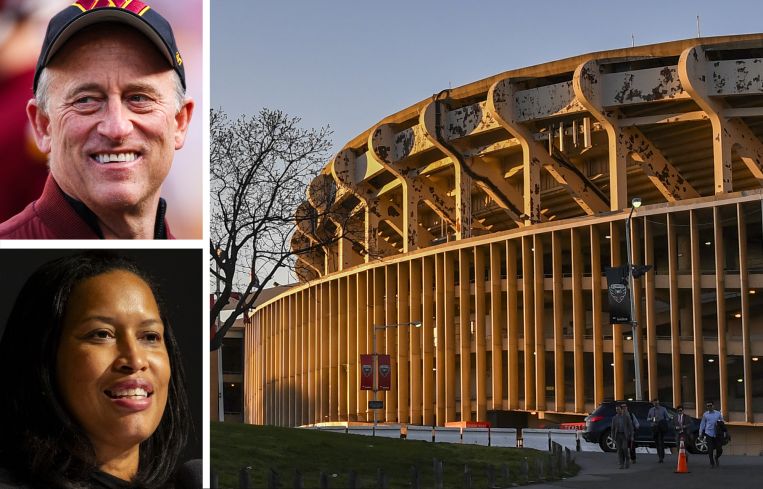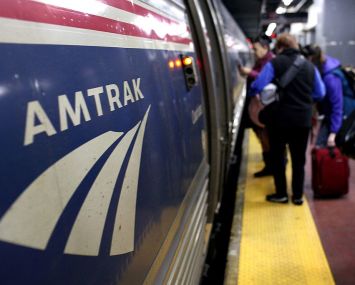Congress Set to Transfer RFK Stadium Back to D.C. Control
The stadium legislation is attached to a stopgap funding bill, which Congress must approve by Friday to avoid a government shutdown
By Nick Trombola December 18, 2024 12:57 pm
reprints
All Washington, D.C., wants for Christmas is RFK Stadium back — and it looks like Santa is finally going to grant that wish.
A measure permitting the transfer of the stadium’s land to D.C. — allowing the District to redevelop about 170 acres on its far eastern edge into an entertainment district, complete with a rejuvenated stadium, retail spaces and residential buildings — was included in a stopgap spending bill on Tuesday that must pass Congress in order to avoid a government shutdown over the holidays. Approval would subsequently allow D.C. to enter into negotiations with Washington Commanders Managing Partner Josh Harris, who previously hoped a new stadium could open by 2030, to bring the football team back to its namesake city.
Federal funding currently runs through Dec. 20, meaning lawmakers have until Friday to pass the new bill. The federal government owns the land upon which the stadium rests, which is why its proposed 99-year transfer to D.C. requires congressional approval.
The Commanders’ possible return to the District is a long time coming, with the football franchise having moved to Northwest Stadium, as it’s now known, in Landover, Md., in 1997.
The approval would also be another major win for D.C. Mayor Muriel Bowser, who has long pushed for the football team’s homecoming, and further, another surprise turn of good fortune for the city, which just one year ago faced the prospect of losing its professional hockey and basketball teams to Virginia. Bowser convinced the owner of the Washington Capitals and Wizards, Monumental Sports and Entertainment, to keep the teams in the District with a $515 million commitment to renovate Capital One Arena and the surrounding area in D.C.’s Chinatown district.
“As a city, we have worked for years toward the opportunity to transform a vacant, blighted sea of asphalt in the heart of D.C. and to put the RFK campus back to productive use,” Bowser said in a statement. “Today, we are pleased and grateful to congressional leaders for advancing this critical bipartisan legislation that recognizes the potential of the land. And the potential is great – for housing and jobs; for sports, recreation, and an entertainment district; for green space, better connections to the river, and monumental views of our nation’s capital.
The stadium deal’s inclusion in the stopgap funding bill comes amid a flurry of negotiations in recent months between D.C. and lawmakers in Maryland. As part of the negotiations tied to the stadium, the bill also includes the transfer D.C.’s National Guard F-16 fighter jet fleet to Maryland, and Maryland receiving full federal funding to rebuild the Francis Scott Key Bridge, which collapsed earlier this year after a malfunctioning container ship struck one of its support columns.
The stadium, and the area surrounding it, has largely stood as a husk of its former self since the city’s sports franchises found other homes; the Washington Nationals baseball team played there in the mid-2000s before moving to Nationals Park in 2008, while the D.C. United professional soccer team played their final game at the stadium in 2017.
“This landmark legislation will unlock the District’s full potential, generate meaningful new jobs, and add millions in additional city revenue for the nation’s capital,” said Rep. James Comer, chairman of the House Oversight Committee and who introduced the legislation last year with co-sponsorship with Eleanor Holmes Norton, D.C.’s non-voting delegate. “Without congressional action, this land would remain vacant, leaving ongoing maintenance costs and liabilities to burden the American taxpayer.”
If approved, the stadium’s transfer would still not end negotiations over its future. Financial incentives for Commanders ownership to return the team to the District would require approval from the D.C. Council, and Bowser has proposed using taxpayer funds to help rebuild the stadium. Yet some council members have expressed skepticism, particularly Charles Allen, who wrote an op-ed for the Washington Post last year arguing that the District should shift its focus away from the troubled football stadium.
Nick Trombola can be reached at ntrombola@commercialoberserver.com.



